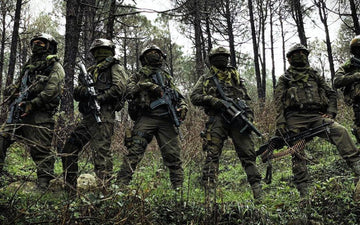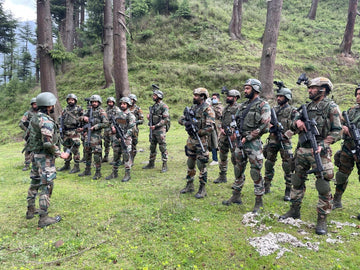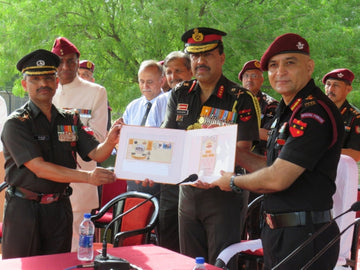Personal Questions
Personal questions aim to gauge your self-awareness and how well you understand your own character, values, and ambitions.
1. Describe Yourself
Answer Strategy: Frame your answer to include your name, family background, education, hobbies, and skills. This question is an opportunity to showcase your personality, align your characteristics with the attributes valued in the Armed Forces, and express your passion for serving.
Example Answer:
“My name is [Your Name], and I hail from [Your Hometown]. I come from a family of [Background], where hard work and discipline were emphasized. I completed my education in [Field of Study], which cultivated my analytical skills. In my free time, I engage in [Hobbies], which not only bring me joy but also build my teamwork and leadership abilities. I believe my strong sense of duty and my commitment to self-improvement make me an ideal candidate for the Armed Forces.”
2. Why Do You Want to Join the Indian Military Forces?
Answer Strategy: Clearly articulate your motivations, including a desire for a disciplined life, an interest in serving your nation, and personal growth opportunities.
Example Answer:
“I aspire to join the Indian Military Forces as it represents the epitome of discipline, integrity, and service to the nation. The opportunity to contribute to my country while developing valuable skills and camaraderie with like-minded individuals is deeply appealing to me. Additionally, my family has a history of military service, which inspires me to continue this proud tradition.”
3. What Are Your Strengths and Weaknesses?
Answer Strategy: Honesty is paramount. Discuss your strengths confidently but also outline your weaknesses while explaining how you're working to improve them.
Example Answer:
“My strongest trait is my ability to remain calm under pressure, which allows me to make rational decisions even in challenging situations. Conversely, I tend to be a perfectionist, which can result in overanalyzing details. Recognizing this, I am learning to prioritize effectively to ensure I maintain productivity while upholding high standards.”
4. Tell Me About Your Family Background
Answer Strategy: Share relevant family details that highlight your upbringing, values, and any traditions that fostered your aspiration to join the Armed Forces.
Example Answer:
“I come from a close-knit family consisting of my parents and two siblings. My father is a [Occupation], emphasizing integrity and hard work, and my mother is a [Occupation], who instilled in us the importance of academic excellence and discipline. These values have profoundly shaped my character and aspirations.”
5. What Do Your Friends Say About You?
Answer Strategy: Highlight feedback from friends that emphasizes positive traits, focusing on qualities that reflect compatibility with military values such as teamwork and resilience.
Example Answer:
“My friends often describe me as reliable and supportive—qualities that have allowed me to foster strong relationships. They appreciate my ability to listen and provide constructive feedback, particularly in group projects where collaboration is essential.”
Situational Questions
Situational questions assess how you would handle real-world challenges, emphasizing your decision-making and leadership abilities.
6. Describe a Situation Where You Displayed Leadership
Answer Strategy: Use the STAR (Situation, Task, Action, Result) method to structure your response clearly.
Example Answer:
“During my college project (Situation), our team faced a tight deadline (Task). I took the initiative to divide tasks based on each member's strengths and coordinated our efforts (Action). As a result, we completed the project ahead of schedule, earning commendation from our professors for our teamwork (Result).”
7. Have You Ever Faced a Challenging Situation? How Did You Handle It?
Answer Strategy: Share an anecdote that demonstrates resilience and effective problem-solving.
Example Answer:
“While leading a community service initiative, we encountered a significant setback when resources fell short (Situation). I organized an emergency meeting (Action) to brainstorm alternatives, which led us to collaborate with local businesses for supplies. This adaptability not only salvaged the project but also deepened community ties (Result).”
8. How Would You Handle a Conflict in Your Team?
Answer Strategy: Focus on communication, empathy, and constructive resolution skills that are pivotal in team dynamics.
Example Answer:
“I believe in addressing conflicts promptly through open communication. If a disagreement arose, I would facilitate a discussion where everyone’s perspective is valued. By fostering an environment of understanding, we can collaboratively arrive at a solution that respects differing viewpoints while reinforcing team cohesion.”
Daily Life and Goals
These questions delve into your daily habits, time management, and personal interests, providing insight into your character.
9. What Is Your Daily Routine?
Answer Strategy: Provide a snapshot of your structured daily activities that reflect discipline and time management skills.
Example Answer:
“My daily routine begins early with a structured morning exercise regimen, followed by healthy breakfast and personal reflection time. I dedicate my day to studying and engagements in extracurricular activities, promoting both academic and personal growth. In the evenings, I enjoy reading and unwinding to prepare for the next day.”
10. What Are Your Hobbies and Interests?
Answer Strategy: Discussing your hobbies should reveal your commitment to personal development and teamwork.
Example Answer:
“I am passionate about playing sports, particularly basketball, which has taught me teamwork and strategic thinking. Additionally, I enjoy hiking, connecting with nature, and enhancing my physical endurance, which I believe is vital for a career in the Armed Forces.”
11. How Do You Handle Stress and Pressure?
Answer Strategy: Showcase your coping mechanisms and highlight your ability to stay focused in challenging situations.
Example Answer:
“I handle stress through a combination of physical exercise and mindfulness practices. Regular workouts help me relieve tension, while meditation helps me center my thoughts. This dual approach has enabled me to tackle academic pressures effectively and maintain a balanced perspective.”
Career and Motivation
This section reflects on your aspirations within the Armed Forces and beyond, providing insight into your motivation and long-term vision.
12. Why Do You Want to Join the Armed Forces?
Answer Strategy: Expand on personal convictions, including loyalty to your nation and aspirations for a disciplined lifestyle.
Example Answer:
“My desire to join the Armed Forces stems from a deep sense of duty to serve my country. I am drawn to the structured lifestyle and the principles of integrity, honor, and teamwork that the military promotes. Additionally, I am eager to contribute to national security and inspire future generations to value service.”
13. What Are Your Long-Term Career Goals?
Answer Strategy: Discuss aspirations within the Armed Forces, including potential roles you aim to achieve.
Example Answer:
“My long-term goal is to rise through the ranks and take on leadership positions within the Armed Forces. I aim to leverage my experiences to mentor junior officers and foster an environment of excellence. Ultimately, I aspire to contribute to strategic planning in defense operations.”
Tips for Answering SSB Questions
While understanding potential questions is essential, knowing how to answer them effectively can make a significant difference in your SSB interview performance. Here are some strategies to enhance your responses:
Be Honest and Authentic
Candidates are often tempted to present themselves in an overly favorable light. However, authenticity resonates well with interviewers. Displaying genuine self-awareness, especially about your weaknesses, can reflect maturity and a willingness to grow.
Show Relevance
When answering any question, try to connect your responses to military ideals such as discipline, leadership, resilience, and adaptability. This alignment not only demonstrates your compatibility with military culture but also strengthens the overall coherence of your narrative.
Use Specific Examples
Employ the STAR technique when responding to situational questions to provide clear, structured, and impactful answers. This methodology ensures you cover all necessary components of your experiences, making your responses more compelling.
Practice
Regular practice with mock interviews and peer feedback can dramatically enhance your confidence and articulation. If possible, seek feedback from veterans or experienced personnel who can provide insights from their own interview experiences.
Structure of the SSB Interview
Understanding the format of the SSB interview can demystify the process and enhance your preparedness. The SSB interview typically spans over five days, including multiple tests and assessments:
- Psychological Tests: Designed to evaluate your personality traits, cognitive abilities, and suitability for military service.
- Group Discussions: Assess teamwork, communication skills, and how well you engage with others in discussing various topics.
- Personal Interviews: A deeper dive into your background, motivations, and experiences that shape your worldview and aspirations.
Conclusion
Preparing for the SSB interview is less about memorizing responses and more about aligning your personal values, experiences, and goals with the principles upheld by the Armed Forces. By reflecting on the 20 real SSB interview questions and their respective strategies highlighted in this article, freshers can enhance their self-awareness and confidence, significantly increasing their chances of success. Embrace this journey as an opportunity for growth, and look forward to a fulfilling career dedicated to serving your nation.
To further assist in your preparation, consider utilizing resources available from SSBCrack and SSBCrackExams, including books, online courses, and eBooks dedicated to maximizing your potential during the selection process. With proper preparation and a strong commitment to your goals, you can successfully navigate this challenging but rewarding path to a career in the Indian Armed Forces.





